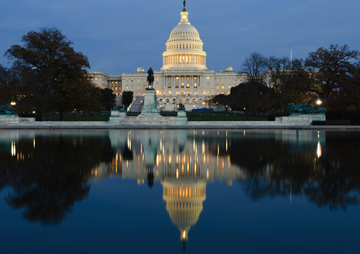Democrats Zero In on Districts Made Vulnerable by Donald Trump
The term "down-ballot" is taking on added significance when it comes to the potential outcomes of battles over congressional seats in what used to be reliably Republican districts. Shutterstock
Shutterstock
Shutterstock
News consumers who have been tuned into mainstream coverage of this American election cycle may have heard the term “down-ballot” tossed around of late. That concept, referring to electoral contests for lesser offices than the presidency that can be influenced by the race for the Oval Office, is taking on added significance when it comes to the potential outcomes of battles over congressional seats in what used to be reliably Republican districts.
So, what has changed? Two words: Donald Trump. The New York Times reported Sunday that several regions in the U.S. that had typically been GOP strongholds were starting to show signs of change that haven’t gone unnoticed by Democratic operatives:
Mr. Trump’s unpopularity, which has already undermined the party’s grip on the Senate, now threatens to imperil Republican lawmakers even in traditionally conservative districts, according to strategists and officials in both parties involved in the fight for control of the House.
Democrats are particularly enticed by Mr. Trump’s dwindling support in affluent suburban areas — including those near Kansas City, Kan.; San Diego; Orlando, Fla.; and Minneapolis — where Republicans ordinarily win with ease. Mr. Trump is so disliked among college-educated voters, especially white women, that he is at risk of losing by double digits in several districts that the 2012 Republican nominee, Mitt Romney, carried comfortably.
“It’s a remarkable situation. We, the Republicans, ought to be in a much stronger position in many suburban areas,” said Representative Charlie Dent of Pennsylvania, whose district includes both suburbs and small cities. “Because of the nature of the nominee, it’s going to be a lot more competitive than it ought to be.”
… Democratic strategists say they believe as many as a dozen districts could become competitive late in the race, depending on Mr. Trump’s fortunes. Among the Republican districts that Democrats see as newly threatened are those held by Representatives John L. Mica of Florida, who represents the Orlando area; Kevin Yoder of Kansas, from the suburbs of Kansas City; and Michael G. Fitzpatrick, a lawmaker from outside Philadelphia who is retiring. Several others represent diverse, economically comfortable areas of California, including Representatives Darrell E. Issa and Ed Royce, from the San Diego and Los Angeles suburbs.
Both parties are also eyeing a set of moderate- to conservative-leaning open seats in states like Indiana and Minnesota, where incumbents are retiring or running for other offices. Republicans fear that Mr. Trump has tainted the party’s brand for any prospective successor in areas without a well-known lawmaker already in place.
Still, even the most sanguine of Democratic boosters are likely to stop short of betting that their party will win the Republican-controlled House of Representatives, the paper noted.
–Posted by Kasia Anderson
Your support matters…Independent journalism is under threat and overshadowed by heavily funded mainstream media.
You can help level the playing field. Become a member.
Your tax-deductible contribution keeps us digging beneath the headlines to give you thought-provoking, investigative reporting and analysis that unearths what's really happening- without compromise.
Give today to support our courageous, independent journalists.






You need to be a supporter to comment.
There are currently no responses to this article.
Be the first to respond.